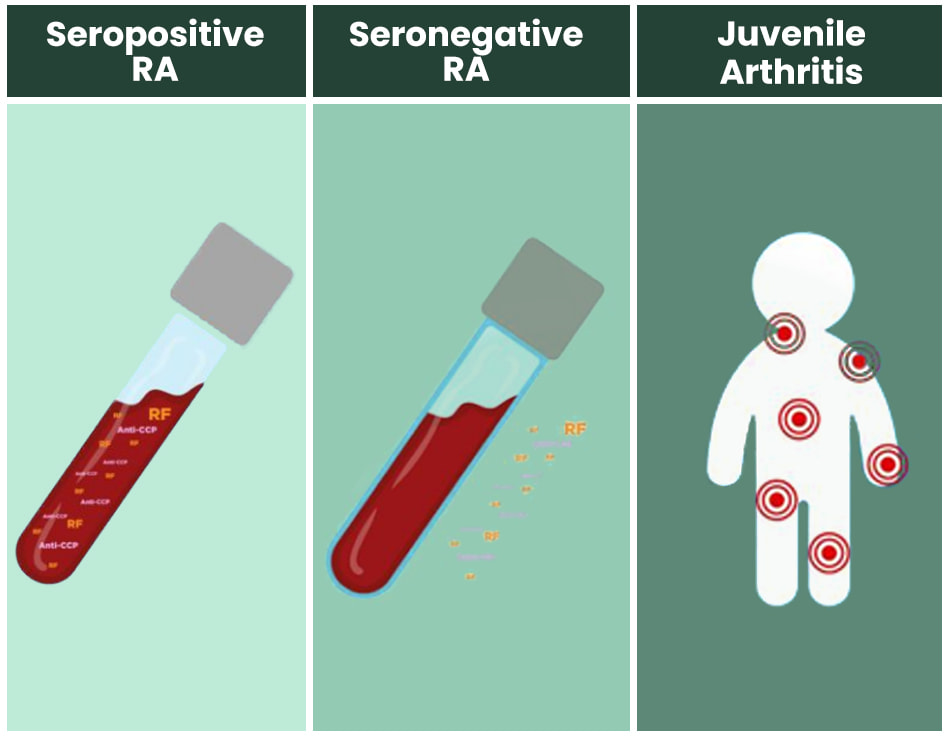Rheumatoid arthritis (RA) is a chronic autoimmune disease which basically affects the joints. It causes; inflammation, pain, stiffness, and swelling in the affected joints, symmetrically (both sides of the body are affected).
In Rheumatoid arthritis, the immune system mistakenly attacks the body's own tissues, specifically the lining of the joints (synovium), leading to inflammation. This inflammation can eventually damage the joint cartilage, bone, tendons, and ligaments, causing deformity and functional impairment.
RA commonly affects the smaller joints of the hands, wrists, and feet, but it can also involve larger joints like the knees, elbows, and hips. The disease is systemic, meaning it can affect other parts of the body as well, such as the lungs, heart, skin, and eyes.It often develops between the ages of 30 and 50, and it affects women more frequently than men.
Early diagnosis and appropriate treatment are crucial in managing Rheumatoid arthritis and minimizing joint damage. Therefore, it's important to consult a healthcare professional if you experience persistent joint pain, swelling, and stiffness.
According to Ayurveda, Rheumatoid arthritis is considered a disorder of the Vata dosha and is known as "Ama Vata." In Ayurvedic terms, it is believed to be caused by the accumulation of toxins (ama) in the joints and tissues, leading to inflammation and pain.
Ayurveda views Rheumatoid arthritis as a result of an imbalance in the body's doshas, particularly Vata dosha. Imbalances in Vata dosha can be caused by factors such as poor digestion, weak immunity, improper diet, stress, and lifestyle choices.
Causes of Rheumatoid Arthritis (Ama Vata)
There are various Causes of Rheumatoid arthritis which are as follows:
- Improper diet.
- Sedentary lifestyle.
- Accumulation of toxins
- Constipation.
- Suppression of natural urges.
- Irregular sleep.
- Stress.
Types of Rheumatoid arthritis

1. Seropositive Rheumatoid Arthritis:
Seropositive RA is the most common type and is characterized by the presence of certain antibodies in the blood, specifically rheumatoid factor (RF) and anti-cyclic citrullinated peptide (anti-CCP) antibodies.
These antibodies are produced by the immune system and can be detected through blood tests. Seropositive RA tends to progress more rapidly and is often associated with more severe joint damage.
2. Seronegative Rheumatoid Arthritis:
Seronegative RA refers to cases where the characteristic antibodies, specifically rheumatoid factor (RF) and anti-cyclic citrullinated peptide (anti-CCP) antibodies, are not detected in the blood.
Despite the absence of these antibodies, individuals with seronegative Rheumatoid arthritis (RA) still can experience similar symptoms and joint inflammation. Diagnosing seronegative RA can be challenging, as it relies more on clinical symptoms, physical examination, and other diagnostic criteria.
3. Juvenile Rheumatoid Arthritis:
Juvenile Rheumatoid arthritis is a form of Rheumatoid arthritis (RA) that affects children and adolescents. It is diagnosed when symptoms appear before the age of 16 and persist for at least six weeks. Early diagnosis and treatment are crucial to managing this condition in children.
Symptoms of Rheumatoid Arthritis (Ama Vata)
- Pain and swelling: Individuals with Ama Vata experience joint pain, swelling, and inflammation. The pain can be severe and is often worse in the morning or after periods of inactivity.
- Stiffness: Stiffness in the joints, especially in the morning or after prolonged periods of rest, is a common symptom. The stiffness can gradually improve with movement throughout the day.
- Digestive disturbances: Ayurveda places a strong emphasis on digestion, and individuals with Ama Vata often experience digestive disturbances. These may include poor appetite, indigestion, bloating, gas, and irregular bowel movements.
- Fatigue and weakness: Ama Vata can cause generalized fatigue and weakness in the body. Individuals affected with RA can feel tired.
- Loss of appetite: Many individuals with Ama Vata may experience a decreased appetite and a feeling of heaviness in the abdomen.
- Morning stiffness: The main feature of Ama Vata is morning stiffness that lasts for hours after waking up. The joints may feel stiff and difficult to move, making it challenging to carry out daily activities.
- Swollen and tender joints: Ama Vata can lead to joint swelling, tenderness, and warmth. The affected joints may feel tender to touch.
- Reduced range of motion: As the disease progresses, Ama Vata can cause a decrease in the range of motion of the affected joints. It may become difficult to perform tasks that require fine motor skills or joint flexibility.
Variation in the symptoms of Rheumatoid arthritis
Symptoms of Rheumatoid arthritis can vary between individuals, and while your experience may differ from someone else with Rheumatoid arthritis (RA), some common symptoms include:
- Joint stiffness
- Swelling and warmth in the joints
- Fatigue
- Fever
- Loss of appetite
RA typically affects the smaller joints first, such as those connecting the fingers to the hands and the toes to the feet. Additionally, Rheumatoid arthritis (RA) can manifest in other areas of the body unrelated to the joints. Approximately 40% of people with RA experience symptoms that impact various parts, including:
- Blood vessels
- Nerve tissue
- Bones
- Heart
- Kidneys
- Salivary glands
- Lungs
- Skin
- Eyes
Over time, the symptoms of RA may spread, eventually affecting joints such as the wrists, ankles, knees, shoulders, hips, and elbows. However, appropriate treatments can help slow down or halt this progression.
The Intensity of RA Symptoms
Symptoms of Rheumatoid arthritis (RA) can range from mild to severe, varying greatly among individuals. Flares, characterized by intensified symptoms, may occur intermittently, while periods of remission can bring relief with milder or absent symptoms.
In some cases, individuals with seronegative RA may experience less pronounced symptoms compared to those with seropositive RA. However, it's important to note that this is not always the case. Factors such as genetics and concurrent health conditions can influence the severity of RA symptoms you experience.
Which Blood tests can detect Rheumatoid Arthritis (RA)?
To diagnose Rheumatoid arthritis (RA), the blood tests which a patient needs to undergo are “anti-CCP” (anti-cyclic citrullinated peptide) and Rheumatoid factor (RA factor).
Let’s know about Imaging Tests that help in RA detection
Medical evaluation and imaging tests play a vital role in disclosing the mysteries within. X-rays, a key tool, helps in diagnosing Rheumatoid arthritis (RA) and establish a reference point for future comparisons as the disease evolves. Further insights may be gained through MRI or ultrasound, investigating into joint damage and detecting signs of inflammation.
How does Ayurveda help in the Management of RA?
Ayurveda acknowledges that each person is unique, and treatment plans are tailored to individual needs, considering factors such as the specific type of RA, overall health, and constitutional makeup. Ayurvedic herbs, dietary changes, and lifestyle modifications are employed to restore balance and promote healing.
The principles of Ayurveda emphasize the importance of adopting a healthy and mindful lifestyle, encompassing aspects such as diet, exercise, stress management, and adequate rest. By including these practices, individuals can support their body's innate healing abilities and reduce the frequency and intensity of RA symptoms.
Ayurveda also encourages personalized dietary recommendations, taking into account the qualities of different foods, the digestive capacity of the individual, and the specific needs of each type of RA. This targeted approach can help reduce inflammation, improve digestion, and nourish the body with essential nutrients, promoting overall well-being.
Moreover, Ayurveda plays a great role in the mind-body connection. Stress and emotional imbalances can worsen RA symptoms, so Ayurvedic practices like meditation, yoga, and breathing exercises are advised to promote relaxation, reduce stress levels, and support mental well-being. Adopt Ayurveda to ease your pain in order to live a happy and healthy life.
